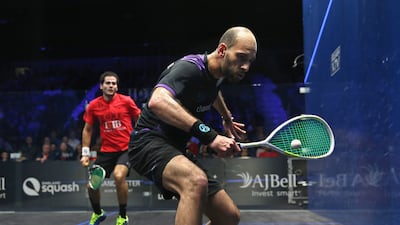A week ago, on his 30th birthday, Egyptian squash world No 6 Marwan El Shorbagy announced he will now be representing England, following in the footsteps of his older brother Mohamed, who made the same move last year.
During his years flying the Egyptian flag, El Shorbagy rose to a career-high world No 3, and has spent 46 consecutive months inside the top 10 since October 2019.
In the official announcement video made by England Squash on July 30, El Shorbagy spoke about his strong ties to the country, having lived there for the past 16 years, and his desire to give back to a place that has given him so much.
El Shorbagy went to Millfield school in Somerset at the age of 14 before attending university in Bristol, where he has been based ever since.
“Since then it’s been my home. I want to give everything in return,” said El Shorbagy. “It’s a hard decision but I know it’s the best decision for me.
“My aim is still to get to the top of the rankings, win a World Championship and try to win as many majors as I can. I'm only 30, I'm young, and I still have a lot of years left if I take care of my body.”
When Mohamed, a former world No 1 and world champion, switched flags and began to represent England last year, there was serious backlash as many Egyptian fans criticised his decision and perceived it as him abandoning his home country.
The reaction to Marwan’s move this week has been mixed, with billionaire Egyptian businessman Naguib Sawiris tweeting out a message of support, while others have expressed their anger at losing a top athlete to another nation, framing it as disloyalty.
Beyond the short video released by England Squash, El Shorbagy has not elaborated on his reasons for making this decision but his brother Mohamed said he was “very happy for him” and noted the opportunities that will open up for Marwan now that he is representing England.
“I think it will be a two-way thing, I think it will be really beneficial for him to get the support from England Squash, especially that he has been living here probably all his life. And the second thing I think it’s going to be good for English players coming up, the juniors and stuff, to see another top-10 player, training, teaming up with him,” said Mohamed.
Athletes choosing to represent a country other than their own is nothing new, and is a common practice almost everywhere in the world.
Brazil-born footballers frequently pop up on national team squad lists across the globe, from China to Qatar, Spain to Turkey, and beyond. African-born athletes are recruited and naturalised in a host of sports like athletics, basketball and football.
Chinese badminton and table tennis players are constantly being wooed by other countries, who want to bag medals in these sports at major events.
Kazakhstan’s active pursuit of tennis players has resulted in them having a Wimbledon champion in Russia-born Elena Rybakina, and reigning NBA MVP Joel Embiid of Cameroon is reportedly being “quietly recruited” to represent USA next year (he moved to the US at the age of 16 and holds American and French citizenships alongside that of his home nation).
Some Egyptian weightlifters, wrestlers and showjumpers have changed their national allegiance in recent years, citing lack of support back home as the reason behind their decision to represent other countries.
While money is often the main driver behind such moves, better training conditions, quality coaching and a stronger chance to be selected for a national team squad (remember when American-born basketball player Becky Hammon won Olympic bronze with Russia?), can also be crucial factors affecting the decision of an athlete to fly a different flag.
Each case is different, and circumstances vary, but ultimately, an athlete choosing to represent another country is always tied to their pursuit of better opportunities that would help them achieve their goals and advance their careers.
In the Shorbagys’ case, they weren’t naturalised with the purpose of playing for England. They gained citizenship by virtue of living in the country since their teenage years and have now decided to spend the closing stages of their respective careers representing England and reaping the benefits that come with that choice.

“We both lived here most of our lives. We did our schooling here, we went to university here, we have the citizenship here. For me, home is here. For him it’s the same, both of us our home is in Bristol, we both have our own places. It does make sense for him [Marwan] to play for England,” explained Mohamed.
We all seek better opportunities in our jobs every day, so why do we demand anything different from professional athletes? It’s true that it is an honour for a sportsperson to represent their country, and one that should never be taken lightly; but does that honour mean you are no longer entitled to make a decision for yourself that would better serve your career trajectory or living conditions or financial security?
If there is a sudden exodus of athletes of a specific sport from a country, it is important to examine the reasons why this is happening and the onus should be on the national governing bodies to provide healthier and more stable environments for their home-grown talents.
Instead of looking at each individual case in an objective manner, sports fans are too quick to judge and an athlete is often lambasted for adopting a different flag.
Many of the Egyptians criticising the Shorbagys are themselves actively searching for ways to get a different passport that would make their lives easier when it comes to travelling and would open up work opportunities for them abroad.
This shouldn’t be seen as a loyalty test – and competing for another country doesn’t mean you are denying your heritage and forgetting where you came from.
Naturalisation in sport can be a complex topic, usually examined in a controversial light and tied to specific countries despite it being prevalent everywhere in the world. I’m all for debating the issue, but perhaps we should check our own hypocrisy first, and realise sport is a profession and athletes are trying to do their jobs and advance their careers just like we are.



